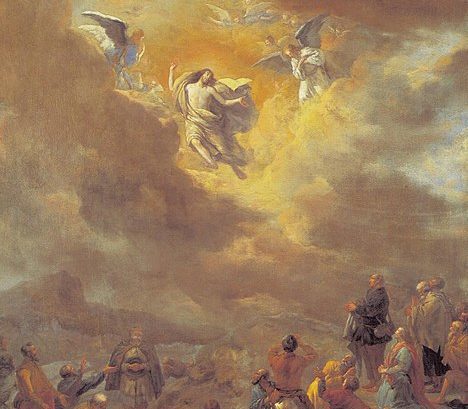The Ascension of Our Lord Into Heaven
Definition
The Ascension is Christendom’s belief of Christ’s going up to Heaven forty days after His Resurrection from the dead. All the creeds affirm the fact, and the Church teaches that Jesus ascended into Heaven in body and soul (Denzinger 801). He ascended into Heaven by His own power: that is, “as God” in divine power and “as Man” in the power of His transfigured soul, which moves His transfigured body at will. In regard to the human nature of Christ, one can also say, with the Scriptures, that it was taken up or elevated into Heaven by God (Mark 16:19; Luke 24:51; Acts 1:9, 11).
The Ascension testifies that, after Jesus, human nature henceforth knows no bounds: it is enthroned at the right hand of the Father in the communion of the Holy Spirit.
So, doctrinally, the Ascension means the final elevation of Christ’s human nature into the condition of Divine Glory. It is the concluding work of redemption. In this sense, we can say that the Ascension of Our Lord into Heaven “completes” the Paschal Mystery. According to the Church’s common teaching, the souls of the just from the pre-Christian era went with the Savior into the glory of Heaven (at the time of the Ascension). So, Christ’s Ascension is the archetype and pledge of our own ascension into Heaven. (From the Latin ascensio, meaning “an ascending,” or “an ascent.”)
When is the Ascension of Our Lord Celebrated?
The Church’s Code of Canon Law includes the Ascension of Jesus among the Solemn Feast Days to be observed by Latin-rite Catholics throughout the universal Church. The text also remarks (that) “The Conference of Bishops can abolish certain Holy Days of Obligation or transfer them to a Sunday with the prior approval of the Apostolic See” (Canon 1246.2).
In many places in the United States, for example, we have seen the Ascension transferred to the following Sunday, and for a twofold reason: First, Holy Days are to be observed with the same solemnity and regard as Sundays. The Catechism of the Catholic Church notes, “On Sundays and other Holy Days of Obligation, the faithful are to refrain from engaging in work or activities that hinder the worship owed to God … and [partake in] the appropriate relaxation of mind and body” (No. 2185). Since this is often impossible on weekdays, moving the Feast to a Sunday makes a great deal of sense.
But, some may ask, why doesn’t the Church maintain the Feast of the Ascension on Thursday (to keep a true 40-day count from the celebration of Easter) but then remove the obligation to attend Mass that day? This leads to the second reason for transferring the Feast to a Sunday: Doing so allows those who cannot attend Mass on Thursday (because of work duties) to share an important, common prayer experience on the Sunday itself which is always considered a Holy Day of Obligation and celebrated with great solemnity as such.
Pope St. Leo the Great: “At Easter, beloved brethren, it was the Lord’s Resurrection which was the cause of our joy; our present rejoicing is on account of His Ascension into Heaven. With all due solemnity, we are commemorating that day on which our (own) poor human nature was carried up, in Christ, above all the hosts of Heaven, above all the ranks of Angels, beyond the highest Heavenly powers to the very throne of God the Father. It is upon this ordered structure of divine acts that we have been firmly established.” (Liturgy of the Hours, Vol. II, p. 937)
Ascension or Assumption?
After His Resurrection into Heaven, we know that Jesus spent 40 days with His disciples. In that time His glorified, resurrected Body was veiled under the ordinary appearance of humanity. After His final words to His disciples (see Acts 1:7-8), the New Testament reports, “as they were looking on, He was lifted up, and a cloud took Him out of their sight” (Acts 1:9). Two men in white garments (most likely Angels disguised as men) then reported that Jesus had Ascended into Heaven (Acts 1:10-11). This is His glorious Ascension.
Notice that the word “Ascension” is an “active” verb, whereas the word “Assumption” (which we use to describe the Blessed Virgin Mary’s entering into Heaven) is a “passive” verb. Our Lord Jesus Christ “Ascended” by His own power as God; Mary did not.
By use of the term “Assumption” we designate the entrance of the Blessed Virgin into glory not by her own doing, but by God Himself. Here is the Second Vatican Council’s summary of this event in the Dogmatic Constitution on the Church (Lumen Gentium): “The Immaculate Virgin, preserved free from all guilt of Original Sin, on the completion of her earthly sojourn, was taken up body and soul into Heavenly glory, and exalted by the Lord as Queen of the Universe, that she might be the more fully conformed to her Son, the Lord of lords and the conqueror of sin and death” (No. 59).
Some Additional Quotes On
Our Lord’s Ascension into Heaven
- Pope St. Leo the Great, Pope: “The Ascension is not only about Our Lord’s Divinity ascending into Heaven, but also about our humanity being admitted to seat itself at the Right Hand of the Father in Heaven!”
- Augustine: “For although He ascended alone, we also ascend, because we are in Him by grace.”
- Collect Prayer for the Ascension Mass: “…For His Ascension is our glory and our hope.”
- And one form of the General Intercessions for the Ascension Mass reads: “King of Glory, through Your Ascension, You took with You our frail humanity to be glorified in Heaven.”
